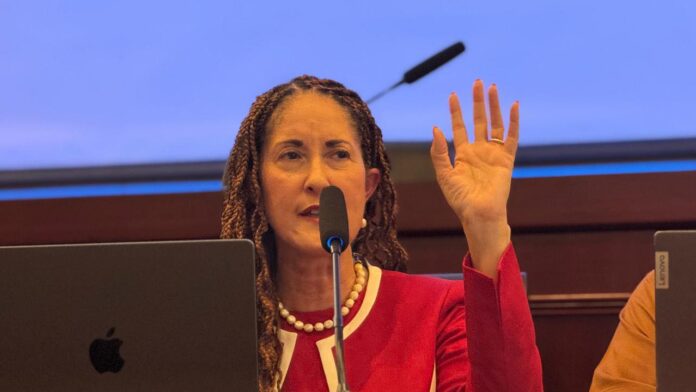MONROVIA – The President of the University of Liberia (UL), Professor Dr. Layli Maparyan, has outlined the financial hurdles facing the country’s flagship higher education institution, emphasizing the urgent need for infrastructure upgrades, payroll reforms, and sustainable funding.
Speaking on the university’s 2025 budget, Dr. Maparyan disclosed that an estimated $3.9 million is required to undertake critical renovation work across the university’s campuses, while an additional $300,000 is needed specifically for bathroom rehabilitation—an area she described as essential for improving the learning and teaching environment.
“We requested a budget of $41 million to cover the university’s pressing needs,” Dr. Maparyan explained. “However, we only received $33 million, and of that amount, 90 percent is committed to salaries alone. This leaves very little room to address infrastructure, student services, and academic innovation.”
According to the UL administration, the heavy concentration of funds on personnel costs has long constrained the university’s ability to invest in research, technology, laboratories, and modern classroom facilities. The gap between the requested and approved budget reflects broader challenges in public sector funding, where education often competes with health, security, and infrastructure for limited national resources.
Dr. Maparyan noted that the condition of UL’s infrastructure poses serious challenges to both faculty and students. Beyond the need for classroom and laboratory improvements, she stressed that basic amenities such as functional restrooms remain inadequate. “Students cannot thrive academically if their most basic needs are not met,” she said, adding that safe, clean, and accessible facilities are vital for preserving dignity and supporting a conducive academic atmosphere.
To address inefficiencies, Dr. Maparyan announced that the administration will undertake reforms targeting the payroll. This includes the removal of “ghost names” from the system—individuals who continue to draw salaries despite not actively working for the institution. Such practices, she said, divert scarce resources away from legitimate staff and hinder the university’s growth.
In addition, the administration intends to enforce retirement policies more strictly. Under Liberian law, the retirement age is 60, and those reaching this limit will be retired from active service. However, Dr. Maparyan clarified that the university recognizes the value of experienced academics and will allow qualified faculty to continue teaching beyond this age, provided they meet academic standards. This, she explained, strikes a balance between creating opportunities for younger professionals and retaining institutional knowledge.
Dr. Maparyan’s remarks come at a time when the University of Liberia is under pressure to expand enrollment, enhance academic offerings, and maintain its role as the country’s leading institution of higher learning. She underscored that without adequate funding, these goals will remain difficult to achieve.
“The University of Liberia is not just another institution—it is the bedrock of Liberia’s intellectual and professional development,” she said. “When we underfund it, we underfund the future of the nation. What we need is a bold, long-term investment strategy that ensures our university can stand on par with institutions across the region.”
The administration is expected to submit a detailed report to the Ministry of Finance and Development Planning and the Legislature, highlighting the university’s most urgent needs and advocating for additional support. Civil society groups and student leaders have already begun calling for stronger government intervention, warning that continued underfunding could derail the quality of education at the nation’s largest public university.
As the academic year progresses, the University of Liberia faces the dual challenge of managing its limited resources while addressing deep-rooted institutional issues. Dr. Maparyan reaffirmed her commitment to transparency, reforms, and advocacy, vowing to ensure that every dollar allocated to UL is maximized for the benefit of students and the nation.
“The challenges are real, but they are not insurmountable,” she concluded. “With prudent management, accountability, and the right level of government support, the University of Liberia can fulfill its mission of educating the next generation of Liberian leaders.”



